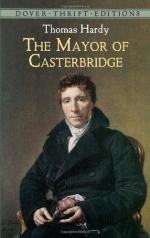“Yes, sir; very.”
Henchard’s face settled into an expression of stolid loneliness which gradually modulated into something softer. “Suppose I had been your real father?” he said. “Would you have cared for me as much as you cared for Richard Newson?”
“I can’t think it,” she said quickly. “I can think of no other as my father, except my father.”
Henchard’s wife was dissevered from him by death; his friend and helper Farfrae by estrangement; Elizabeth-Jane by ignorance. It seemed to him that only one of them could possibly be recalled, and that was the girl. His mind began vibrating between the wish to reveal himself to her and the policy of leaving well alone, till he could no longer sit still. He walked up and down, and then he came and stood behind her chair, looking down upon the top of her head. He could no longer restrain his impulse. “What did your mother tell you about me—my history?” he asked.
“That you were related by marriage.”
“She should have told more—before you knew me! Then my task would not have been such a hard one....Elizabeth, it is I who am your father, and not Richard Newson. Shame alone prevented your wretched parents from owning this to you while both of ’em were alive.”
The back of Elizabeth’s head remained still, and her shoulders did not denote even the movements of breathing. Henchard went on: “I’d rather have your scorn, your fear, anything than your ignorance; ’tis that I hate! Your mother and I were man and wife when we were young. What you saw was our second marriage. Your mother was too honest. We had thought each other dead—and—Newson became her husband.”
This was the nearest approach Henchard could make to the full truth. As far as he personally was concerned he would have screened nothing; but he showed a respect for the young girl’s sex and years worthy of a better man.
When he had gone on to give details which a whole series of slight and unregarded incidents in her past life strangely corroborated; when, in short, she believed his story to be true, she became greatly agitated, and turning round to the table flung her face upon it weeping.
“Don’t cry—don’t cry!” said Henchard, with vehement pathos, “I can’t bear it, I won’t bear it. I am your father; why should you cry? Am I so dreadful, so hateful to ’ee? Don’t take against me, Elizabeth-Jane!” he cried, grasping her wet hand. “Don’t take against me—though I was a drinking man once, and used your mother roughly—I’ll be kinder to you than he was! I’ll do anything, if you will only look upon me as your father!”
She tried to stand up and comfort him trustfully; but she could not; she was troubled at his presence, like the brethren at the avowal of Joseph.




